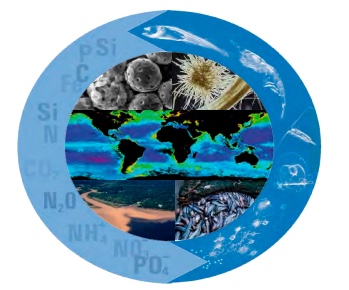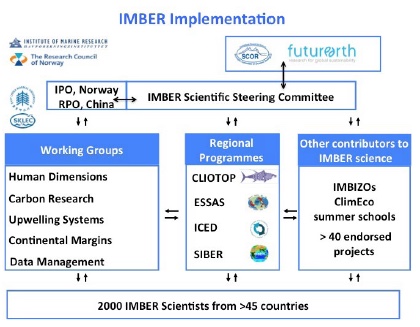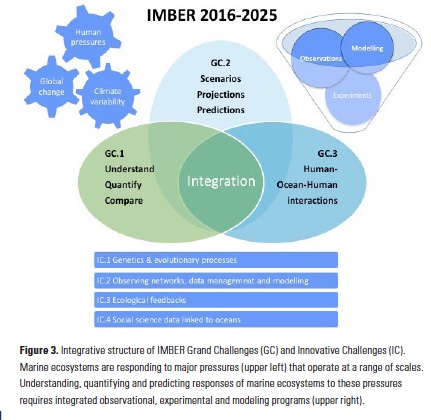By Eileen E. Hofmann, IMBER Past-Chair (Old Dominion University, Norfolk, VA) and Carol Robinson, IMBER Chair (University of East Anglia, Norwich, UK)
The Integrated Marine Biogeochemistry and Ecosystem Research (IMBER) project grew from a desire by the international marine science community to address the challenges of understanding the interactions and relationships between biogeochemical cycles and food webs across multiple space-time scales, and to quantify and predict marine system responses to natural and anthropogenic forcings. IMBER was initiated in 2005 as a joint project of the International Geosphere-Biosphere Programme (IGBP) and the Scientific Committee on Oceanic Research (SCOR) with the central goal to provide a comprehensive understanding of, and accurate predictive capacity for, ocean responses to accelerating global change and the consequent effects on the Earth system and human society. IMBER has its origins in previous IGBP-SCOR projects, the Joint Global Ocean Flux Study (JGOFS) and the Global Ocean Ecosystem Dynamics (GLOBEC) project, which highlighted knowledge gaps and limitations in the global research capacity for integrated approaches across multiple scales and key processes that were needed to understand global change effects on marine ecosystems.

Figure 1. Schematic of interacting science themes that guided the first decade of IMBER research (2005-2015), illustrating the linkages between food webs and biogeochemical cycles (Theme 1 key interactions, outer circle), marine organisms (such as calcifying and nitrogen-fixing phytoplankton) that respond to global change (Theme 2 sensitivity to global change, upper panel), a global chlorophyll distribution (Theme 3 feedbacks to the Earth system, middle panel), and human-marine interactions including fisheries (Theme 4 responses of societies, bottom panel).
During the past ten years (2005-2015), the IMBER goal has been pursued through science activities under four overarching and interlinked themes that consider key interactions in marine ecosystems, sensitivity to global change, feedbacks to the Earth system, and responses of society (Fig. 1). IMBER has addressed these themes through international coordination, capacity building activities, regional programs, working groups, national contributions, endorsed projects, and integrative, project-wide activities (Fig. 2). In-depth regional and topical analyses and comprehensive comparisons of diverse marine ecosystems have provided new understanding about the potential effects of global environmental change on biogeochemical cycling, food web dynamics, and impacts and linkages to human systems at multiple scales. The focus of a global community of natural and social scientists on a specific research agenda facilitated these important advances (see (1) for an overview).
The IMBER project is now undergoing a transition in parallel with changes and transitions in the global environmental research community. The IGBP ended operations in late 2015, following the ending of other international science coordination bodies, the International Human Dimension Programme, DIVERSITAS and the Earth System Science Partnership. These multiple organizations were replaced with a single overarching program, Future Earth, a 10-year international research initiative focused on providing the knowledge and support to accelerate transformations to a sustainable world. The science plan and implementation strategy (SPIS) that guided IMBER for the past 10 years is ending, which provides the opportunity to reconsider IMBER’s vision and goal in light of its accomplishments and research needs and directions for the future.
IMBER began the process of developing a new SPIS with its 2014 Open Science Conference (OSC). The OSC provided an opportunity for the marine science community to present key findings of IMBER-relevant research and promote integrated syntheses of IMBER research. It also gave a planned opportunity to solicit and discuss approaches for updating the IMBER research agenda to guide future research into marine biogeochemistry, ecosystem structure and functioning, the human dimensions of global marine change, and interactions between each of these. The outputs from the OSC, subsequent community-wide consultations, and inputs from partner organizations and national programs resulted in the development of a new IMBER SPIS to guide the next decade of research, and to provide the basis for IMBER to transition to becoming a core project of Future Earth and to continue as a research focus for SCOR.
The new IMBER SPIS recognizes that the evolution of marine ecosystems (including biogeochemical cycles and human systems) is linked to natural and anthropogenic drivers and stressors. This broadened the IMBER vision to focus on ocean sustainability under global change for the benefit of society. This vision is supported by a research goal for the next decade to: Understand, quantify and compare historic and present structure and functioning of linked ocean and human systems to predict their future structure and functioning and develop options for securing or transitioning towards ocean sustainability.
The integrated research agenda for the next decade supports this new vision and goal, and is based on three grand challenges that focus on climate variability, global change and human drivers and stressors, and innovation challenges that focus on new areas for IMBER where research is needed and where it is believed that major achievements can be made within 3-5 years (Fig. 3). The first grand challenge considers the state and variability of marine ecosystems, the impacts of natural variability and anthropogenic global change, and interactions across time and space scales. This is further developed in the second grand challenge, which focuses on predictions and projections of ocean-human systems at multiple scales, including improving ecosystem models for scenario testing and evaluation, and considerations of biodiversity maintenance and direct anthropogenic drivers such as fishing. The final grand challenge focuses on improving and achieving sustainable governance and recognizes the need to improve the science-policy-society interface and develop new linkages between marine and human systems. This challenge includes “communicating relevant information and knowledge needed by society to secure sustainable, productive and healthy oceans.” Implementation of the grand challenges in a 3- to 5-year time horizon is provided by the innovation challenges that consider metabolic diversity and evolution, global ocean observational and modeling networks, ecological feedbacks in the Earth system, and social science data for ocean management, decision-making and policy development.
With its new SPIS, IMBER will maintain its strong commitment to basic, curiosity-driven science and expand into new areas of problem-driven, policy-relevant interdisciplinary research. The IMBER project is now evaluating its working group and regional program structure with a view towards better alignment with the new SPIS. As IMBER moves forward into a new decade of research, the project will maintain the legacy of IGBP, continue to contribute to the objectives of SCOR which focus on promoting international cooperation in planning and conducting oceanographic research, and solving methodological and conceptual problems that hinder research, and transition to a core project of Future Earth to contribute to their vision of supporting research which enables transformation to global sustainability and equitability. The IMBER SPIS is undergoing final review by SCOR and Future Earth and will be jointly published by both organizations in 2016.
References
1. Hofmann, E.E. et al., 2016. Anthropocene, doi:10.1016/j.ancene.2015.12.002.






